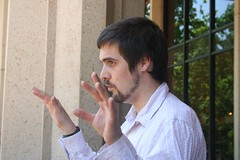i will (hopefully) never accept the suggestion that experience can trump analysis. of course, experience is quite necessary to inform, maintain, develop, and support analysis, but any argument butt-ended with an irreducible witness to an existential higher ground gerrymandered upon the axis of you-just-had-to-be-there ( "you just don't know what it's like," "you don't know me," "it's a cultural thing," etc.) is at once violently depraved and unresolvably pretentious - at least as much as a sister argument that is as myopically speculative as this one is anecdotal.
i never in my life have imagined that violence could be such a disease. this afternoon, the civil rights/civil liberties group were dicussing areas - personal, cultural, communal - requiring our critical attention, with a look towards reform, renewal, reimagination, etc. we waded through suggestions that school funding be a priority for reform, that work must be done to improve the national attitude towards mississippi's perceived backwardness, that structures should be in place to promote a healthier cultural exchange and level of understanding between identity groups, etc. however, when the conversation struck upon the issue of violence within culture - in respect to both daily instantiations of playfighting, bickering, and physical conflict withing the school building, as well as a grander manifestations of gang violence, neighborhood disorder, and ghetto survival-of-the-fittest narratives - a wildfire erupted in the classroom. any sympathy for the possibility of nonviolent conflict resolution, or even a turn-the-other-cheek attitude towards minor, mundane confrontation was met with a profoundly loud and profoundly strong championing of the responsibility of an individual to push back, fight back, cuss back, etc. - if only in order to protect one's social reputation, though also to preempt future, amplified harm. to many students, it seemed inconcievable, undesirable, and to some degree embarrassing to imagine a response to agression that was not itself agressive - in either equal or greater measure.
recently, rachael was in conversation with a mother - and pastor of a local congregation - who recounted an instance where she (the mother) went to her son's school building to physically resolve a conflict that her son was having with another student. in regards to any seeming contrast that such a decision may have with the implications of her vocation, the mother responded: "i'm a good christian - but i'm a mother first!" it seems that the students in my classroom were proliferating a similar doublethink. invocations of the social importance of ghandi and mlk were met with battlecries of "my mother told me to never let anyone hit me," weakly allied with the "by any means necessary" stance of malcolm x. eventually, the last frontier seemed to be a deeply entrenched "you don't know what it's like being me" and "you can't change people" stance thrown up against those students who were legitimately concerned that violence would old beget violence, that "an eye for an eye leaves everyone blind," and that the everyday violence of the school building was part and parcel with grander social woes. clearly, this discussion is in a very nascent stage, but i'm convinced - by the unexpected and immediate energy that ripped through the classroom - that this is an important crossroads for the group to fix itself to for the time being, and develop a mature and critical response to the whole mess. for me, it's back to breaking up the constant bickering and playfighting in my classroom - only now with the understanding that many of our student leaders - intellectually and socially - both accept and promote the economy of violence as a way of life.
[for those of you who'd like a context for some "you're an outsider and don't know what you're talking about" fodder: i'm a second-year teacher in a public high school in jackson, ms. i teach mathematics to 10-12th graders. the school is 99% afro-american (there are two white kids and and handful of latinos somewhere in the building), and the vast majority of students receive free/reduced lunch. the participants in the civil rights/civil liberties club are predominantly freshman/sophmores from jim hill, and nearly all also participiate in the schools's international baccalaureate programme. other participants in the club come from two other high schools in the district, and one private school in a nearby suburb. the visiting students are predominantly juniors/seniors, and majority white. all the participants in the club are predominantly female, and no male members were present at today's meeting.]
the twit
2.28.2007
Subscribe to:
Post Comments (Atom)

1 comment:
So true. So sad, and so true.
Post a Comment